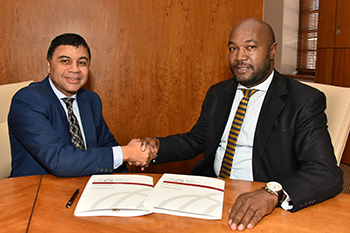Latest News Archive
Please select Category, Year, and then Month to display items
12 January 2024
|
Story Nonsindiswe Qwabe
|
Photo Sonia Small
 Since joining the UFS in 2008, Dr Grey Magaiza has worked extensively on approaches that can foster the socio-economic transformation of societies.
Since joining the UFS in 2008, Dr Grey Magaiza has worked extensively on approaches that can foster the socio-economic transformation of societies.
“The future should be one where communities can decide on their development agenda and futures. That’s the most important for me.” Dr Grey Magaiza, Deputy Director of the Centre for Gender and Africa Studies (CGAS) and Head of the Community Development programme on the Qwaqwa Campus, is passionate about capacitating communities to be agents of change and advancement. His vision for the future emphasises the empowerment of communities to take charge of their development by actively participating in decision making and the implementation of development projects that can improve their lives.
Since joining the UFS in 2008, Dr Magaiza has worked extensively on approaches that can foster the socio-economic transformation of societies. Over the years, he has crafted his research speciality into one that he is most proud of – being an interdisciplinary scientist immersed in the development of communities.
“I’m in a fortunate position of researching what I like. I say ‘fortunate’, because I’ve taken the time to understand what I’m passionate about, which is the overall field of rural livelihoods and livelihood futures – in short, community development. My research starts from an engaged university, understanding the elements that a university must use to enhance transformation and relevance to its immediate community in terms of development.”
One of the ways he has done this is by looking at social entrepreneurship as a development approach for young people in a rural setting. Through workshops with non-profit and civic organisations in Qwaqwa, Dr Magaiza has been helping these organisations to map out their needs and actively meet them through the involvement and support of external role players.
“We understand that communities are part of the national development agenda, but even that national agenda respects community knowledge and intentions and allows communities to shape their identity. A critical enabler of this is community organising. You bring back the capacity in communities to have dialogues on issues affecting them as spaces for engagement, knowledge exchange, and for people to just talk about their way forward.”
By enabling communities to define their development agenda, they can address their specific needs, challenges, and aspirations, he said. “When I look at livelihood futures, it’s quite an exciting aspect of my work – it’s like looking into a fortune tellers’ globe, because you’re not deciding for communities what they should do, but the communities themselves take those decisions.”
Funding of R8.7million for skills development in manufacturing and teacher training signed over to UFS
2017-06-19

The MerSETA (Skills and Training Authority for Manufacturing, Engineering and Related Industries) signed a Memorandum of Agreement (MOA) with the University of the Free State (UFS) for a grant of approximately R8.7million on 14 June 2017, which will be disbursed over a three-year period.
UFS seeks to bridge the skills gap
As a response to the need for skills development in the manufacturing, engineering and related industries sector, and as an institution of higher learning optimally placed to serve the population of central South Africa, the UFS proposed a partnership with MerSETA to address challenges in the sector. The interventions that MerSETA will fund include training for 600 vocational teachers, research and development of a green building mechanical index, in-service training for 60 IT Teachers and microbotics classes for 100 students.
The CEO of MerSETA, and UFS alumnus Dr Raymond Patel, said the funding for rare skills such as in science and engineering are of great importance for the country. The ability to train teachers and to upskill them will yield great results for the economy as a whole. Rector and Vice-Chancellor Prof Francis Petersen said the UFS partnership with SETAs and with MerSETA in particular should be mutually beneficial, and went a long way in integrating first-generation university students to be better-prepared for university studies.
Collaboration and support key within university departments
The delegates visited the Departments of Education and Engineering Sciences on the Bloemfontein Campus, where they met project leaders Louis Lagrange from the Faculty of Natural and Agricultural Sciences, Dr Nixon Teis, Faculty of Education, and Pat Lamusse, Institutional Advancement. Present at the signing ceremony were members of the Rectorate, the Acting Dean of the faculty of Education, Prof Loyiso Jita, and Dean of the Faculty of Natural and Agricultural Sciences, Prof Danie Vermeulen, as well as researchers who will be working on the green building mechanical use index and other MerSETA representatives.